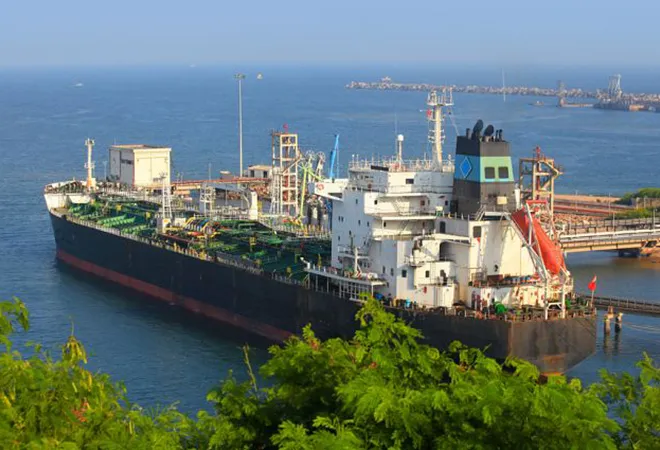-
CENTRES
Progammes & Centres
Location

Image Source: SNEHIT
Large ship on the Bay of Bengal
Prime Minister Narendra Modi will be in Nepal later this week attending the fourth summit of the Bay of Bengal Initiative for Multi-Sectoral Technical and Economic Cooperation (BIMSTEC) summit in Kathmandu. During his deliberations with regional leaders, the Prime Minister is likely to emphasise connectivity, counter-terrorism, radicalisation and maritime security in the Bay of Bengal, a key area of discussion during recent meetings.
It was after the BRICS-BIMSTEC outreach summit in Oct 2016 that Bay states got serious about ‘comprehensive’ security in their shared littoral. Their discussions since have revolved around issues of both hard security and soft development, including environmental protection and ‘Blue Growth’ -- a developmental priority for many regional governments.
National security chiefs have met regularly seeking to enhance cooperation in diverse areas, pushing for the Bay’s recognition as a common security space.
Still, progress has been slow. Notwithstanding the enhanced emphasis on issues of human security and socio-economic development, smaller Bay states have struggled to evolve systems and procedures to address vexing challenges such as armed robbery, terrorism, illegal fishing and migration. More worryingly, regional governments have failed in arrest the decline of natural habitats across the shared littoral. In particular, rampant illegal fishing has caused a huge dip in fish-stocks, with illicit practices like bottom trawling and the use of seine nets severely depleted marine wealth, creating a massive ‘dead zone’ in the middle of the Bay of Bengal.
Meanwhile, coastal regions are witnessing a rapid expansion of plastic pollution. Studies show that of the US$13 billion in annual estimated damage to the marine ecosystem, a significant portion comes from South Asia. Unfortunately, the regional response to the challenge has been inadequate. Notwithstanding nascent efforts to partner with international organisations such as the Global Environment Facility, the Asian Development Bank, and the Food and Agriculture Organisation, Bay states haven’t come around to effectively addressing the principal impediments to marine governance: unsustainable fishing, pollution and destruction of habitat, and vulnerability of coastal communities to a changing climate.
For India, a complicating factor has been its inability to rein in the fisheries subsidies program, with the government continuing to support small fishermen via sops such as fuel, motorisation of boats, and provision of gear.
At a World Trade Organisation Ministerial meeting in Buenos Aires in December 2017, Indian officials insisted on continuing with a national program for fisheries subsidies, unless members agreed to special and differential treatment for developing states. That the subsidies program has led to overcapacity and overfishing in India’s seas -- resulting in a significant rise in illegal fishing -- have seemed beyond the pale of discussions.
Paradoxically, the centerpiece of New Delhi’s marine developmental initiative is a Rs. 8000 crores sea exploration proposal focused mainly on ocean energy and seabed mineral resources.
If seabed mining seabed resources has been the focus of official attention, few seem interested in marine life conservation. Even with ‘Blue Economy’, New Delhi has made tall promises, but struggled to deliver results. Many in government believe the term refers to ocean-dependent economic development. As they see it, inclusive social development, environmental balance and ecological security, though important, should not trump the larger imperative of financial expansion and industrial growth.
No developmental strategy, however, is likely to deliver results unless it can improve the lives of coastal communities. For this, the political leadership needs to impose limitations on technology-based economic development, pushing the industry to meet its social obligations for the protection and conservation of coastal and marine ecosystems. The challenge for Bay states is to get industry interested in a social model of blue growth that does not focus exclusively on commercial interests.
Of course, terrorism remains the most significant threat in the region, with BIMSTEC members continuing to work towards halting the spread of violent extremism and radicalisation. During the security chiefs’ meeting at Dhaka in March this year, the focus was on enhancing law enforcement coordination and intelligence exchanges.
The other area of all-round interest is connectivity and marine infrastructure creation. Bay states have been collectively working on a master plan for connectivity, sought to reach an understanding on the establishment of a grid interconnection, and even concluding an agreement on mutual assistance on customs matters. Promisingly, a pact on coastal shipping seems on the anvil.
To deepen regionalism, member states know their security initiatives need high-level political attention. This means endowing BIMSTEC with resources, strengthening capabilities through reforms, and enhanced political focus.
On the sidelines of a joint military exercise at Pune, shortly after the summit at Katmandu, army chiefs of Bay states are likely discuss collective responses to common challenges.
Yet, India’s driving compulsion is to respond effectively to China’s expanding political and economic footprint in South Asia. As Chinese state-owned enterprises establish a stronger presence in India’s near littorals, there is a sense that New Delhi’s political leverages are being steadily eroded. This is one reason why the Modi government is placing so much emphasis on strengthening regional connectivity, with northeastern India acting as a bridge between South Asia and Southeast Asia
The views expressed above belong to the author(s). ORF research and analyses now available on Telegram! Click here to access our curated content — blogs, longforms and interviews.

A former naval officer Abhijit Singh Visiting Fellow at ORF. A maritime professional with specialist and command experience in front-line Indian naval ships he has been ...
Read More +